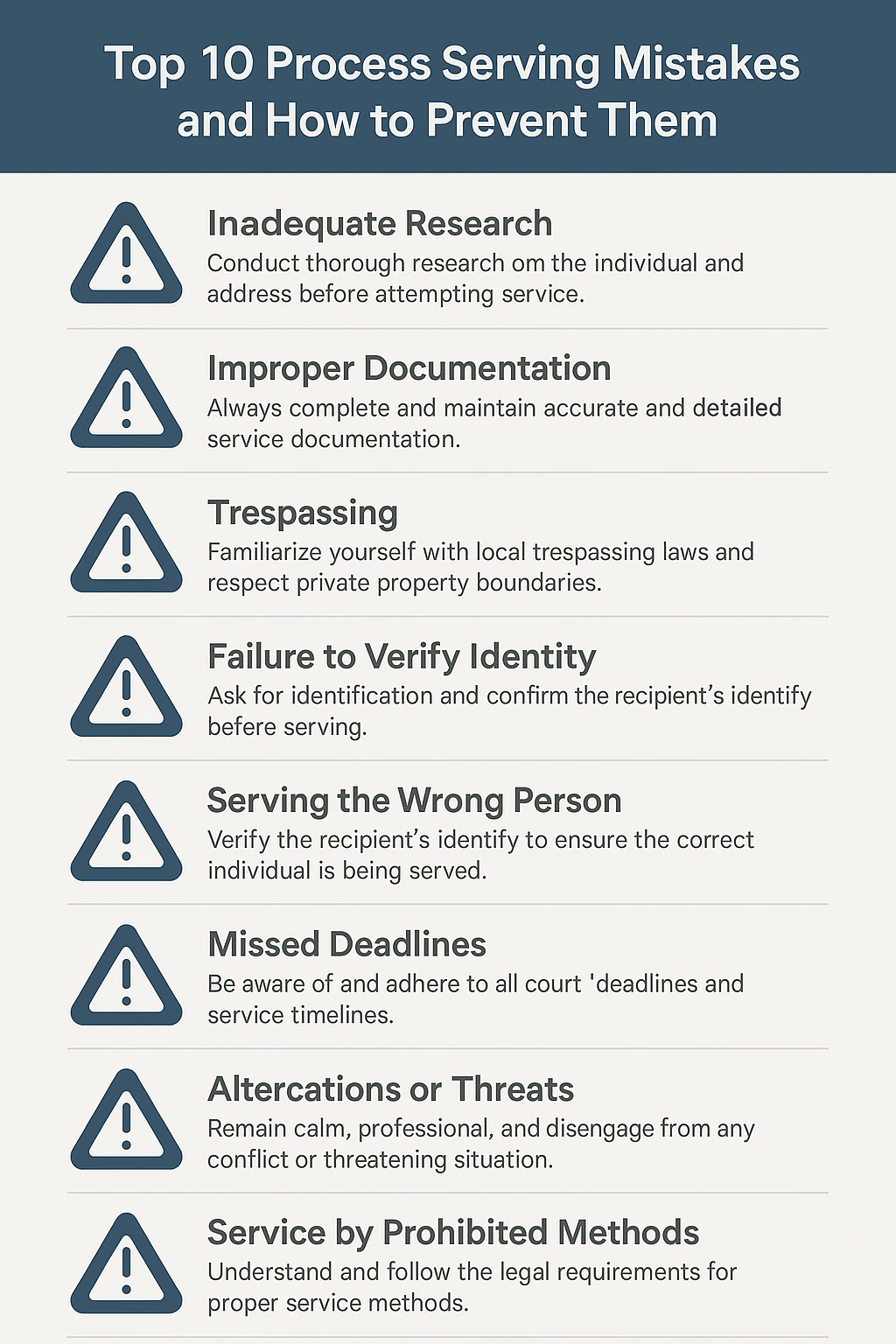Top 10 Process Serving Mistakes That Can Cost You Your Case
Process serving errors can have devastating consequences for legal cases, potentially leading to dismissals, delays, and significant financial losses. Understanding the most common mistakes helps attorneys and process servers avoid costly pitfalls that jeopardize successful litigation outcomes. This comprehensive guide examines the ten most critical process serving errors, their consequences, and prevention strategies under current Oklahoma law.

Mistake #1: Inadequate Address Verification
The Problem
Serving documents at outdated or incorrect addresses represents the most common process serving failure. Many process servers rely on single-source address information without conducting comprehensive verification, leading to invalid service and case dismissals.
Legal Consequences
- Jurisdiction Loss: Courts may dismiss cases for lack of personal jurisdiction
- Delay Costs: Restart service timelines and extend litigation schedules
- Professional Liability: Malpractice claims against attorneys for inadequate service
- Client Relations: Damaged attorney-client relationships and case outcomes
Prevention Strategies
- Skip-tracing database searches (TLOxp, Accurint, IRBsearch)
- Public records verification (property, voter, utility records)
- Employment and professional license verification
- Social media and internet presence investigation
- Family and associate contact research
- Cross-reference minimum three independent sources
- Verify address recency within 90 days
- Document all research efforts in detailed affidavits
- Maintain written verification procedures and checklists
Mistake #2: Improper Timing and Deadline Violations
The Problem
Oklahoma statutes mandate specific service timelines that, when violated, can invalidate entire cases. Process servers frequently misunderstand deadline calculations, weekend rules, and holiday extensions under 12 O.S. §2004.
Critical Timing Requirements
- Summons Service Deadlines: 90 days from filing for most civil cases; 60 days for domestic relations matters; extensions require court approval before expiration; calculation excludes weekends and court holidays
- Service Hour Restrictions: Permitted between 6:00 AM and 10:00 PM; Sunday service restricted unless court-authorized; holiday service generally prohibited; emergency orders may override standard restrictions
Prevention Strategies
- Calendar systems with automatic deadline calculations
- Multiple reminder notifications and alerts
- Staff training on Oklahoma-specific timing rules
- Client communication regarding deadline requirements
- Time-stamped service attempts and completions
- Holiday and weekend service authorization documentation
- Extension request filings and court approvals
- Backup service method implementation protocols
Mistake #3: Insufficient Documentation and Affidavit Errors
The Problem
Incomplete or inaccurate affidavits represent a leading cause of service challenges and case dismissals. Courts require specific information and language compliance under Oklahoma statutes and court rules.
Required Documentation Elements
- Process server identification and authorization
- Defendant identification and description
- Service date, time, and location specifics
- Document identification and delivery confirmation
- Service method and attempt documentation
Common Documentation Failures
- Generic or template language without case-specific details
- Missing signature notarization or improper notary procedures
- Inadequate defendant description or identification
- Failure to document alternative service attempts
- Incomplete witness information or missing statements
Prevention Strategies
- Develop case-specific affidavit templates
- Implement mandatory review and approval processes
- Train staff on notarization requirements and procedures
- Maintain witness contact information and availability
- Create photographic and GPS documentation protocols
- Peer review before court filing
- Client approval and verification processes
- Regular training updates and education programs
- Professional consultation and expert review services
Mistake #4: Wrong Person Service and Identity Errors
The Problem
Serving documents to incorrect individuals due to inadequate defendant identification creates invalid service and potential due process violations. Oklahoma courts strictly enforce personal service requirements under constitutional standards.
Common Identity Mistakes
- Serving family members or household residents
- Corporate service on unauthorized individuals
- Service based on name similarity without verification
- Assumption of identity without proper confirmation
Documentation Inadequacies
- Vague or generic defendant descriptions
- Missing physical characteristic documentation
- Failure to request identification verification
- Inadequate photograph or video evidence
Prevention Strategies
- Photograph or video documentation of defendants
- Request identification documents when possible
- Obtain detailed physical descriptions and characteristics
- Use multiple verification sources and methods
- Document any identification refusal or evasion
- Defendant identification techniques and procedures
- Legal authority and limitations understanding
- Professional conduct and ethical requirements
- Emergency procedures and safety protocols
Mistake #5: Alternative Service Procedure Violations
The Problem
When personal service proves impossible, Oklahoma law permits alternative service methods under 12 O.S. §2004(D). However, improper alternative service procedures frequently invalidate service and violate due process requirements.
Alternative Service Requirements
- Multiple address verification attempts
- Employment and residence investigation
- Family and associate contact efforts
- Professional database searches and skip-tracing
- Time-stamped documentation of all attempts
Related Resources
Process Serving Guides
Avoid Costly Mistakes - Work With Professionals
Our licensed Oklahoma process servers have over 50 years combined experience and follow all best practices to ensure valid service.